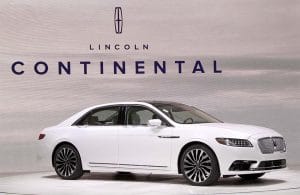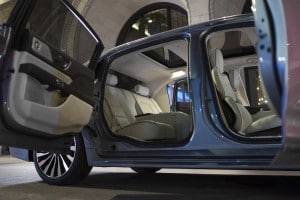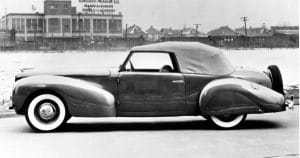
Despite much fanfare, the Lincoln Continental failed to generate much interest after its rebirth four years ago.
Four years after reviving the once-legendary nameplate, Lincoln is again abandoning the Continental, a victim of the ongoing shift from sedans and coupes to SUVs and CUVs.
The decision to drop the Continental follows the move by the sibling Ford brand to eliminate all of its passenger cars models but for the distinctive Mustang “pony car.”
“Lincoln is investing in growth segments and the brand will feature a full portfolio of SUVs, including a fully electric vehicle in the future,” the upscale marque said in a statement. “Lincoln will continue to keep its newest SUVs fresh and we will have more news to share later this year; however, as the full-size premium sedan segment continues to decline in the U.S., we plan to end production of the Lincoln Continental at the end of this year.”
(Newest Lincoln Continental gets some Coach-ing for 2019.)
The original Continental was developed as a one-off vehicle, the personal car of Edsel Ford, son of Ford Motor Co. founder Henry Ford. It was designed by Eugene “Bob” Gregorie and made a splash when it was driven by the executive during a March 1939 vacation in Florida. Based on the production Lincoln Zephyr, it introduced several critical design cues, including the long hood, short trunk and external, covered spare tire, which became signature of the Continental line for decades.
In the years when Detroit brands dominated the U.S. luxury market, the “Conti” was a major status symbol. President John F. Kennedy was being driven in an open-top model when, in November 1963, he was assassinated during a visit to Dallas.
The Continental remained the flagship of the Lincoln brand but a poorly received 1995 redesign sealed its fate, Lincoln pulling it from production amidst weak sales in 2002.
Ford decided to bring the nameplate back as part of a broader push to revive the Lincoln brand – which it had considered dropping earlier in the decade. A well-regarded 2013 concept turned into a 2016 production model that received far harsher reviews. The automaker tried to up the panache by introducing a limited-volume version with the rear “suicide doors” the Continental was known for back in the 1960s. The Coach Door Edition — priced at $115,470, $40,000 more than the top-line Black Label version of the standard Continental — quickly sold out, but the more mainstream model continued losing momentum.
(Lincoln unveils glamorous new limited edition Continental.)
Sales peaked in 2017, the full first year of production, at 12,012, tumbling nearly 50% the following year. By 2019, demand slipped to just 6,586, barely a third of the 18,656 Navigators Lincoln moved.
Lincoln isn’t alone, however. Sales of all luxury sedans have tumbled over the last several years, highline buyers following mainstream motorists in the move from passenger cars to light trucks. Significantly, luxury sedans, coupes and sports cars posted the sharpest sales decline of all segments during the pandemic lockdowns, luxury SUVs suffering comparatively modest slumps.
The Continental will fade away during the 2021 model-year, according to Ford. The automaker appears to be leaving open the possibility it may continue on in China. Buyers in the world’s largest market still have a taste for sedans, though they are beginning to follow Americans in the shift to utility vehicles.
Lincoln previously announced that it is also abandoning the smaller MKZ sedan which will leave the marque without even a Mustang equivalent, marking its first time ever without a sedan or coupe in its line-up.
The MKZ also had the dubious distinction of being the last Lincoln to retain the alpha badging, a nomenclature that buyers generally called confusing. The Continental was the first new model to switch back to a more traditional naming strategy.
(Lincoln lures Leibovitz to launch Continental campaign.)
With the demise of the last two sedans, Lincolns will be left with four utility vehicles: the new Corsair – which previously was known as the MKC – the Nautilus, the Aviator and the Navigator that is today the brand’s flagship. An all-electric model is scheduled to arrive in the next several years.




What is poor Matthew McConaughy going to do????